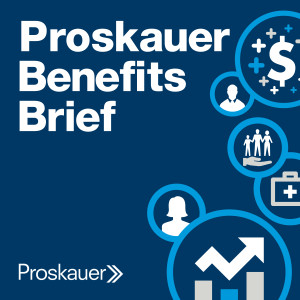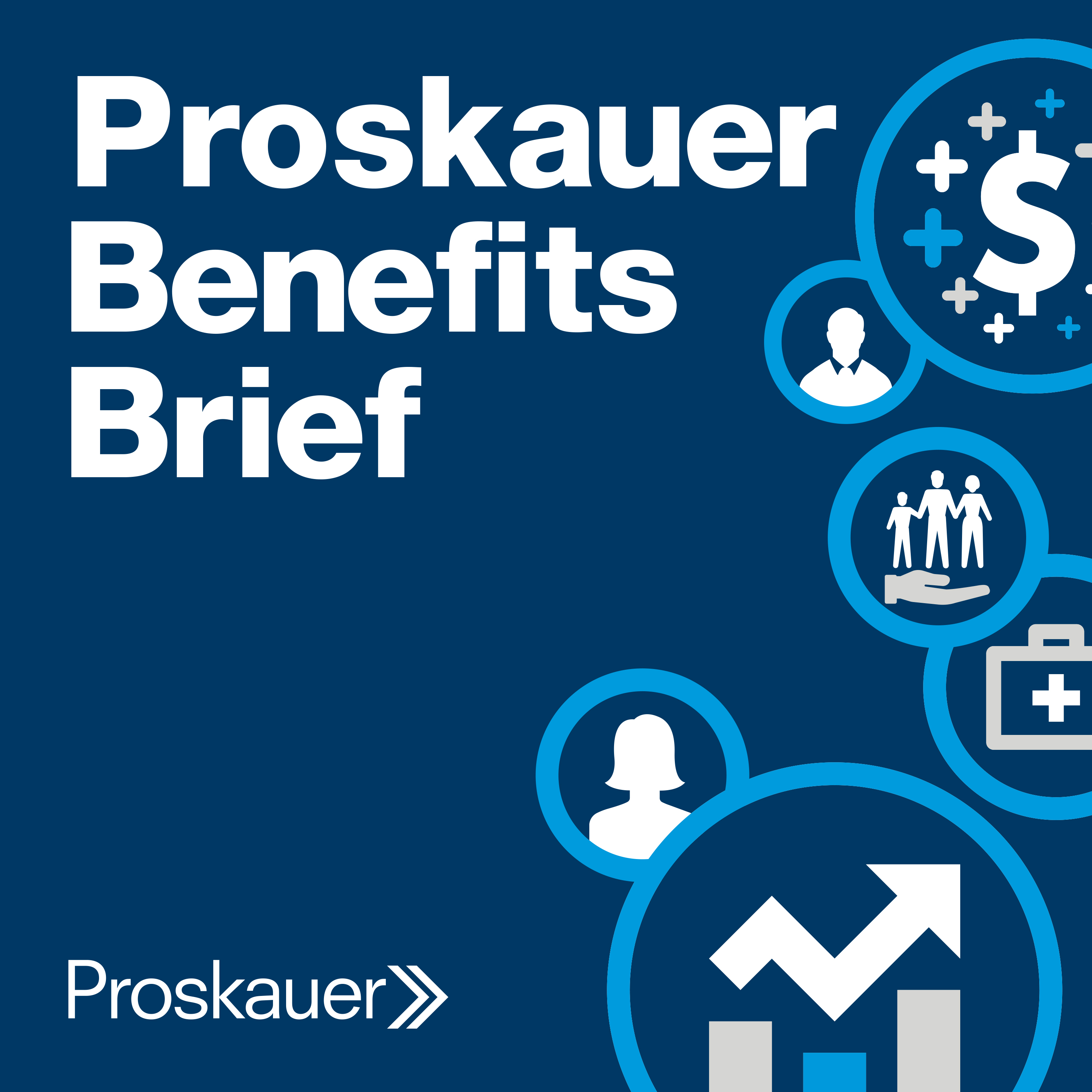
Episodes

Monday May 13, 2019
Episode 24: Plan Assets Exceptions for Private Investment Funds
Monday May 13, 2019
Monday May 13, 2019
In this episode of the Proskauer Benefits Brief, partner Ira Bogner and senior counsel Adam Scoll provide an overview of the plan assets exceptions for private investment funds, and discuss why such plan assets exceptions matter to private investment fund managers that might want to accept investments from ERISA-covered plans. Given that compliance with a plan assets exception may prove to be quite complex, they highly recommend that private investment fund managers consult with experienced ERISA legal counsel during all phases of their fund formation and fundraise, and Proskauer is always here to help in that regard. Be sure to tune in to this episode.

Monday Apr 01, 2019
Episode 22: Suspension of Benefits Issues
Monday Apr 01, 2019
Monday Apr 01, 2019
In this episode of the Proskauer Benefits Brief, partner Paul Hamburger, and associate Katrina McCann discuss the suspension of benefits rules, and the unique and interesting issues that arise when defined benefit plan participants work beyond their normal retirement age. Plan sponsors and administrators should tune in, as these rules are quite complicated and are often misunderstood.

Tuesday Mar 19, 2019
Episode 21: Attorney-Client Privilege in the Employee Benefit Plan Context
Tuesday Mar 19, 2019
Tuesday Mar 19, 2019
In this episode of the Proskauer Benefits Brief, Paul Hamburger, co-chair of Proskauer’s Employee Benefits & Executive Compensation Group, and associate Joe Clark discuss how the attorney-client privilege rules apply in an employee benefit plan context. The attorney-client privilege allows for the free flow of information between an attorney and a client in order to insure that the client gets the best possible representation. We discuss the various specific rules that apply in the employee benefit plan context where information is often shared between attorneys and plan fiduciaries. Be sure to tune in for the latest insight on this significant issue and visit Proskauer’s Employee Benefits and Executive Compensation Blog for more information.

Tuesday Jan 08, 2019
Tuesday Jan 08, 2019
In this episode of The Proskauer Benefits Brief, partner Ira Bogner and senior counsel Adam Scoll discuss the key considerations for ERISA plan fiduciaries when delegating investment authority over plan assets. We will break down some of the material ERISA issues that may apply when an ERISA plan hires a separate account investment manager or invests in a private investment deemed to be holding ERISA plan assets.

Wednesday Dec 19, 2018
Episode 19: Proposed IRS Regulations Affecting 401(k) and 403(b) Plans
Wednesday Dec 19, 2018
Wednesday Dec 19, 2018
In this episode of the Proskauer Benefits Brief, Paul Hamburger, co-chair of Proskauer’s Employee Benefits & Executive Compensation Group, and associate Steven Einhorn discuss the recently proposed IRS regulations addressing the hardship withdrawal rules affecting 401(k) and 403(b) plans. We will discuss challenging questions employers and administrators face as they work through the new requirements, which include the elimination of the six-month contribution suspension for participants who take a hardship withdrawal and how many plans will need to be amended as a result of these new proposed regulations. Be sure to tune in for the latest insight on this very important issue and visit Proskauer’s Employee Benefits and Executive Compensation Blog for more information.

Wednesday Dec 19, 2018
Episode 18: Texas Judge Declares Affordable Care Act Unconstitutional
Wednesday Dec 19, 2018
Wednesday Dec 19, 2018
In this episode of the Proskauer Benefits Brief, partner Robert Projansky and associate Katrina McCann discuss the recent district court case, Texas et al. v. The United States of America, which declared the Affordable Care Act (ACA) unconstitutional. On December 14, 2018, a district court judge in the Northern District of Texas deemed the entirety of the Affordable Care Act invalid because he found the individual mandate to be unconstitutional. From what would happen to the employer mandate to emergency care coverage, tune in as we discuss what these changes could mean for employers and plan sponsors if the court’s decision is ultimately upheld.

Friday Nov 09, 2018
Friday Nov 09, 2018
In this episode of The Proskauer Benefits Brief, partner Ira Bogner and senior counsel Adam Scoll discuss the key considerations for ERISA investors in private investment funds, as well as a plan fiduciary’s overarching fiduciary duties and responsibilities that are related thereto. One of the first key considerations is to determine the plan asset status of the private investment fund. Tune in and listen as we break down the material ERISA issues for ERISA investors to consider when investing in private investment funds.

Monday Jul 02, 2018
Episode 7: Fixing Retirement Plan Overpayments
Monday Jul 02, 2018
Monday Jul 02, 2018
In this episode of the Proskauer Benefits Brief, Paul Hamburger, co-chair of Proskauer’s Employee Benefits & Executive Compensation Group, and associate Katrina McCann discuss how to fix retirement plan overpayments, based on (1) the type of plan (i.e., defined contribution or defined benefit plan), (2) whether the overpayment was with respect to a lump sum or ongoing payments, (3) the type of overpayment (whether it was to the wrong person or paid at the wrong time), and (4) who caused the overpayment. They discuss the requirements, the decisions involved, and certain ERISA and taxation issues that can arise when addressing these overpayments.

Tuesday Apr 03, 2018
Episode 2: The Ten Things You Need to Know to Survive an IRS Audit
Tuesday Apr 03, 2018
Tuesday Apr 03, 2018
In this episode of the Proskauer Benefits Brief, Paul Hamburger, co-chair of Proskauer’s Employee Benefits & Executive Compensation Group, and associate Katrina McCann discuss the top ten things employers need to know to survive an IRS audit. Although plans can be audited at any time, the IRS is focused on Employee Plans Team Audits (EPTA), which deal with large plans that cover 2,500 or more participants. Even though the number of EPTA plans is fewer than 1%, the IRS has found that these plans cover approximately 60% of all participants and nearly 70% of all plan assets. So, whether you are subject to an EPTA audit, a random audit of a smaller plan, or an issue-specific audit, be sure to listen and understand how these tips can help you survive the IRS audit process.

Monday Feb 26, 2018
Episode 1: Severance Pay Plans & ERISA
Monday Feb 26, 2018
Monday Feb 26, 2018
In this episode of the Proskauer Benefits Brief, senior counsel Anthony Cacace and partner Robert Projansky discuss how severance plans can be subject to ERISA. We examine the key advantages of having severance pay arrangements covered by ERISA and what employers can do to design plans that comply with the substantive and procedural requirements of ERISA, but also maximize the likelihood of benefitting from ERISA coverage. Whether a severance plan or arrangement is governed by ERISA is a rather fact-intensive analysis, so be sure to tune in for how those facts and circumstances can give rise to an ERISA plan.
